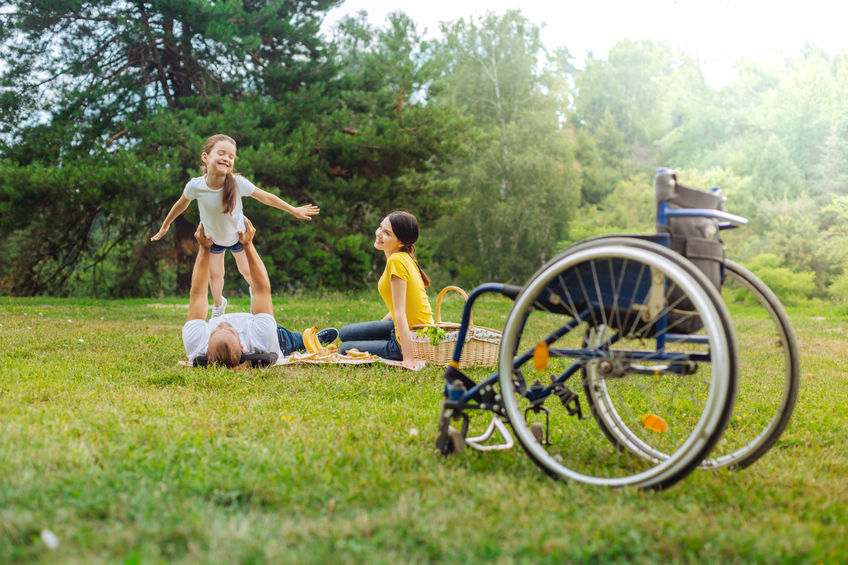
Helping a group of people find agreeable plans is right in my husband’s wheelhouse.
Many years ago, Larry was attending one of Carly’s IEP planning meetings at her school. It was the first time he had participated directly in the special education annual planning process, and I was very eager for him to see how those conversations unfolded. You see, those “team” meetings were tense and stressful for me. I never really felt like an equal voice on that team, despite being Carly’s parent. And though I had passionate perspectives about what goals and objectives were documented on Carly’s IEP, I usually left those meetings feeling dismissed and defensive, wondering if I was crazy.
Am I being unreasonable?
Will they ever see Carly’s potential as we do or
am I just a biased mom who is just seeing what I want to see?
Are my expectations fair?
I felt very alone in that room every spring and the situation seemed worse every year. So, I asked Larry to take time off work and come with me. He was willing to come but was unconvinced that he could add any value. I can no longer recall specifics. But I remember him saying something like, “I don’t know half of what you know about all of this stuff. And I fully support you in whatever you think is best. I can’t imagine there’s anything I would have to add.”
What happened that day was unexpected and transformative in how we valued each other and approached our caregiver-parent roles from that point onward. You see, Larry sat quietly listening during that meeting. He didn’t say much at all. But at a couple of points when there seemed to be misunderstanding or impasse, he spoke briefly and gently, with pointed clarity. He affirmed my perspective, restated the goals as he understood them (brought the conversation out of the weeds), and reassured everyone that Carly deserved our collective accountability.
The room fell silent for a moment and the tone shifted. Suddenly, I felt like they were taking us more seriously. The veiled pushback also slowed, and we heard fewer excuses like, “parents often observe levels of function at home that their children simply don’t display at school.”
I could have resented Larry’s influence in that day (frustrated that I couldn’t accomplish that on my own), but I actually fell in love with him all over again, appreciating his gift for mediating conversations and rallying people around common vision.
Conversation in the car on the way home revealed how frustrated Larry had been recognizing all the politics and agendas I had been dealing with for years. I felt very validated. He had also noticed how his presence alone combined with a few choice words made an important difference. He committed right then and there to attend every IEP meeting he could after that. He never missed one.
All these years later, we have both found our places in various other areas on the home team. That is to say, each of us has settled into our sweet spots as teammates in caring for Carly. For example, he keeps Carly busy wrestling or snuggling by the tv while I make dinner. Afterwards, he washes dishes while I hang out with Carly. We discuss things like budgets and health plans, but he maintains most of the paperwork and spreadsheets for her SSI, insurance, and waiver. I focus on writing the narrative portions of annual plans and guardianship confirmations.

It isn’t about whether we are pulling equal weight or that the number of hours either of us puts into the process is comparable. It is about how we are learning to leverage and optimize our own unique strengths, talents, capacities and perspectives to ensure the Carly, our marriage, and our family thrive.
It’s not like we have achieved perfection — not by a long shot! But a good process is underway. In some ways, we have fallen into our roles naturally or intuitively. In other ways, we have had to be more intentional. In any case, we have some clarity of understanding about how each of us adds value now. And, though we’ve been sufferably slow to grow in this area, we’re getting better at overtly expressing appreciation to each other more regularly too.
We are also trying to stay alert to how and when adjustments are needed. We’re both willing to step into the other person’s role, when necessary, and have each other’s back. So, when one of us is sick, for example, we know what the essential things are and how to step into each other’s shoes for a short period of time. And we know what is not essential and can be left for a time when circumstances “normalize” again. God forbid we need to translate this strategy to a long-term situation, we have some general confidence that either of us would have a foundational strategy from which to build. For sure, a whole lot of new building would have to happen (tremendous support would be needed if either of us ended up having to do this without the other) but having common understanding about the essential basics gives some powerful peace of mind. Beyond that, we must simply pray.

How the roles play out in your situation will not look like ours. You have your own unique skillset and temperament. So does your spouse. So do any other people collaborating in caring for your child or loved one. It will be richly satisfying, faith-building and rewarding for everyone when you agree to explore the array of needs involved and discover each other’s sweet spots.
RELATED: 8 Habits of Caregivers with a Robust Support System
You and your team may benefit from a traditional SWOT analysis. Periodically review the division of labor in your home in these categories: S=Strengths, W=Weaknesses, O=Opportunities, and T=Threats.

Such a review may help clarify roles, validate or affirm team members for their contributions, highlight gaps in coverage, reveal needs for fluidity, identify needs for more delegation or collaboration, support healthier boundaries, confirm why someone is needing more rest, and bring greater respect to those whose contributions are more indirect but no less valuable (e.g., someone serving as the “primary breadwinner” outside the home).
Examples of Responsibilities In the Caregiving Household
Note: This is certainly not an exhaustive list. And these items are listed in no order of importance or priority.
- Monitor health and wellbeing
- Manage medications
- Manage and coach behaviors
- Oversee, assist or implement bowel/bladder regimen
- Oversee, assist or implement feeding program (This may include special diet, special feeding supports, NG tube, G-J tube, and other extra prep needs.)
- Plan and prepare meals
- Shop for the household (food, clothes, etc.)
- Monitor daily/hourly nutrition and hydration
- Provide support during night wakings
- Plan and coordinate schedules which may include medical and dental appointments, therapies, school activities, caregiver support staffing, volunteers
- Research medical/developmental conditions, therapies, programs
- Attend IEP or 504 Plan meetings and provide input on documentation
- Implement or oversee curriculum and/or therapies and/or vocational-rehab program
- Maintain an orderly home including medical and incontinence supplies, adapted equipment, toy hygiene/rotations, etc.
- Maintaining housekeeping including extra soils created by the disability situation (e.g., messy eating far exceeding typical developmental stages, behaviors that may include pantry invasion)
- Wash and fold laundry which can involve upholstery, protective pads, frequent bedding changes, etc.
- Put out trash including diaper pails, sharps containers, and excess medication disposal
- Mend, sew, or purchase adapted clothing
- Fill water softener and change furnace filters
- Pay bills, balance the checkbook, audit finances (bank account balances, credit cards), do/coordinate taxes
- Hire/train/supervise nursing staff, PCAs, and paid caregiver support staff
- Recruit/train/coordinate/supervise unpaid volunteers
- Share in parenting and discipline (which can include the involvement of behavior therapists/coaches)
- Complete regular paperwork for schools, doctor appointments, therapies, church, state/county
- Organize/maintain documentation (e.g., guardianship/conservatorship applications and annual renewals, wills, disability/social security receipts, IEPs, 504 Plan, medical records, waiver/grant/respite budgets)
- Tend the yard and gardens (e.g., mowing, shovel, weeding)
- Complete or arrange household repairs and/or modifications (e.g., grab bars, ramps)
- Maintain vehicles which may include adaptations for wheelchairs, youth car seats, seat protectors, handicapped license plates
Does seeing this extensive list grow your awareness and appreciation for all that goes into caring for your child, grandchild, sibling or friend? Does it intimidate or overwhelm you? Does it trigger resentment or a spirit of competition in your family as you reflect on why you may carry an unbalanced portion of the responsibility? Can you give your team a pat on the back upon remembering the many responsibilities you are juggling together?
It is about how we are learning to leverage and optimize our own unique strengths, talents, capacities and perspectives to ensure the Carly, our marriage, and our family thrives.
It is my prayer that the list will empower you to embrace opportunities. Invite conversations about how to adjust for a more balanced system that optimizes individual and family strengths. Also, let it be an experience of receiving reassurances from God that fill your emotional, physical, mental and spiritual fuel tanks. Let God be your utmost Anchor of encouragement and strength so you can serve generously and even sacrificially but cheerfully.
Ephesians 3:16
I pray that out of his glorious riches he may strengthen you with power through his Spirit in your inner being.
I hope this post can be a springboard for greater appreciation, empathy, and compassion — for yourself and others. I hope it helps you recognize that your ultimate strength comes from Jesus.
Tell us in the comments about what helps you and your caregiving team. Is the list missing something? What have you been learning from your role as a caregiver? What encourages you as you love and serve your family?

Lisa Jamieson is a caregiver consultant, pastoral counsellor and author of popular books and Bible studies including Finding Glory in the Thorns and Jesus, Let’s Talk. Lisa and her husband, Larry, live in Minnesota with the youngest of their three grown daughters, Carly, who has Angelman Syndrome. Together, the Jamiesons founded Walk Right In Ministries in 2008, a non-profit organization building faith and community with special needs families.


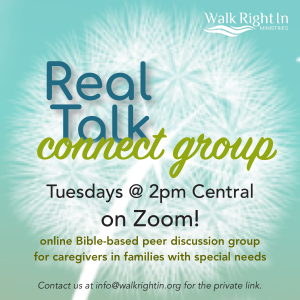

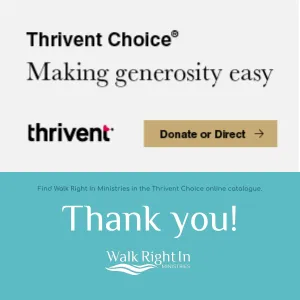


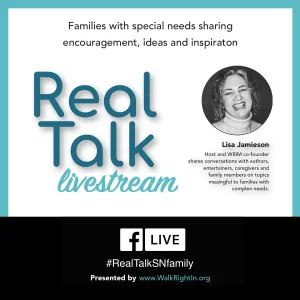
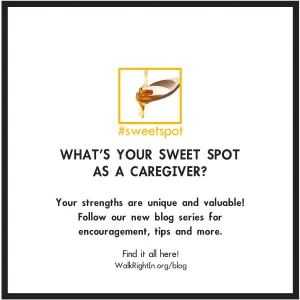

0 Comments